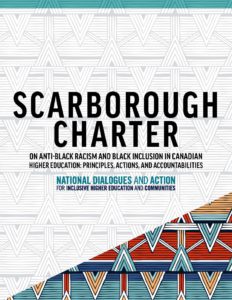On behalf of the University of King’s College, and with the endorsement of King’s Board of Governors and faculty, President William Lahey has signed the Scarborough Charter on Anti-Black Racism and Black Inclusion in Canadian Higher Education: Principles, Actions, and Accountabilities, adding King’s to the list of universities and colleges from across Canada that have committed themselves to the Charter and its implementation. Developed as a tool to guide “concrete actions for change in higher education and in our communities” on anti-Black racism and Black inclusion, the Charter was written “with input from various members of the higher education sector and other partners” across Canada.
Read the Scarborough Charter
With this important step, King’s becomes part of the inter-institutional forum created by the Charter, contributing to and learning from the continuing national dialogue on anti-Black racism and Black inclusion in Canadian Higher Education which the Charter envisages.
Lahey said that becoming a signatory institution is “an important milestone event in the history of King’s that we are determined to make a cornerstone of our much different future as a university where Black students, faculty and staff can flourish, including because of our strong collaborative relationships with Black communities.”
One such collaboration is the 2023 Universities Studying Slavery (USS) Conference that King’s will host together and in partnership with Dalhousie University and with the Black Cultural Centre of Nova Scotia. The conference, titled “Slavery, Reparations and Education: African Nova Scotia, Canada and Beyond” will be the first of the USS consortium conferences to be held outside of the United States.
A core obligation of universities that sign the Charter is the development of an action plan to guide the Charter’s implementation and holistic integration into all aspects of university decision making. Equity Officer Rhema Ferguson will play a leadership role in ensuring this obligation is addressed in the Equity, Diversity and Inclusion Action Plan Ferguson is already developing. The Charter will be integrated into the academic planning that takes place within King’s faculty and it will also be incorporated into the work of the King’s Board of Governors, which will receive regular reports on its implementation.


